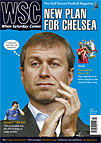 Zenit St Petersburg may be suddenly popular in one half of Glasgow, but the manner of their success means they have been losing fans in Russia. Saul Pope explains
Zenit St Petersburg may be suddenly popular in one half of Glasgow, but the manner of their success means they have been losing fans in Russia. Saul Pope explains
Not many people outside Russia know it, but the country has two capitals. Moscow, the official capital, is the centre of business, politics and power; its people are seen elsewhere as being arrogant and pushy. St Petersburg, the “Northern capital”, is the country’s centre for culture and the arts; its people are considered to be polite and intelligent, although Muscovites see them as provincial. This dichotomy has largely been true of post-Communist Russian football: Zenit St Petersburg have played a stylish and attacking game, and have become popular among fans outside Moscow, but have always been outshone by the capital’s big guns. Until now, that is.
Zenit won the 2007 Russian title, the club’s first since 1984, followed by the UEFA Cup, largely by beating the Muscovites at their own game: they spent a lot of money given to them by powerful people. CSKA and Spartak have traditionally had the biggest budgets, but this all changed in 2005 when Russia’s largest company, gas exporter Gazprom, paid €27.9 million (£22m) for a 51 per cent stake in Zenit.
This enabled the club to compete on the international and domestic transfer markets. Following the arrival of Turkey striker Fatih Tekke for €10m, the domestic transfer record was broken twice in December 2006 when Pavel Pogrebnyak and Alejandro Domínguez were signed for around €7m each. A further $20m (£10m) was later spent on Anatoliy Tymoschuk – the Ukraine midfielder was then rated by newspaper Sport Express as the league’s 2007 player of the year. Although Pogrebnyak has also shone, Tekke and Dominguez have been less impressive but have still proved wiser choices than Dinamo Moscow’s biggest foreign splurge – Maniche played just 13 games following a €16m transfer in 2005.
Zenit have also proved more successful in their choice of manager. Spartak, Dinamo, Lokomotiv and CSKA have all flirted with high-profile foreign coaches, none of whom has lasted more than a season. Dick Advocaat’s appointment was initially treated with scepticism, with some Zenit fans noting his age and the fact that his successes had come in relatively “easy” leagues. His quiet demeanour was also at odds with that of his predecessor, rent-a-quote Czech Vlastimil Petrzela, who famously said that Zenit would “never be champion”, a reference to some questionable refereeing decisions following a match against Lokomotiv Moscow.
Someone had to make way for the new signings: local hero Alexander Kerzhakov was sold to Sevilla, a move that caused conflict between club and fans. Advocaat then left Vladislav Radimov, another local boy and a former captain, on the bench; only the title win vindicated these decisions.
The sniping started, with the Moscow-based sports press referring to Zenit as having won the “Gazprom-League”. Editorials also made reference to the well placed connections Zenit have within the Russian elite (club president Sergey Fursenko is the brother of a government minister). Even a St Petersburg newspaper commented: “Zenit is a team that the Russian regions have stopped loving, respecting and supporting. Now millions have been poured into Zenit, it is becoming exactly what we hate about the Moscow clubs: a fat cat… waving its merchant’s hand and buying up famous footballers for crazy prices.”
Anyway, can Zenit keep it up? Moscow, with its cosmopolitan lifestyle and considerable expat communities, will always prove more of a draw for foreign players, especially considering the small but vocal racist element within the Zenit support. Although Advocaat has denied saying that he would not sign a black player because of fans’ opposition, his predecessor admitted that the club’s management warned him against doing exactly this. Apparently in response to Petrzela’s plans in 2004, a Zenit fan invaded the pitch during a UEFA Cup game wearing a T-shirt with the slogan “There’s no black in Zenit’s colours”. The club can point to their anti-racism initiatives, the majority of well adjusted fans and the well liked Korean players in their squad, but it’s almost impossible to imagine the club integrating black players as successfully as the Moscow clubs have.
Meanwhile, some are questioning the wisdom of letting two central defenders, Erik Hagen and Martin Skrtel, leave in the close season; with Nicolas Lombaerts out with a long-term knee injury, Roman Shirokov (who normally plays in midfield) has had to plug the gap. The personnel problems could be compounded if the side’s main creative force, Andrei Arshavin, leaves for Spain or England after Euro 2008.
Domestically, Zenit have so far not been able to rediscover last year’s form – going into the Euro 2008 break, they have won just one game out of six. The merchant’s hand will no doubt wave again during the summer transfer window, but it remains to be seen – with the UEFA Cup distraction out of the way – whether Zenit can catch up.
From WSC 257 July 2008